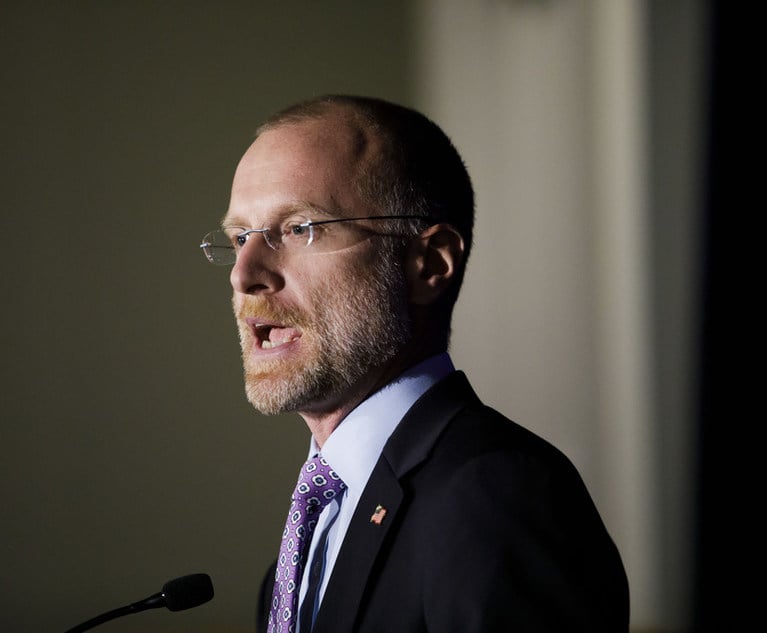 Heath Tarbert. Photo: Diego M. Radzinschi/NLJ
Heath Tarbert. Photo: Diego M. Radzinschi/NLJCFTC Takes Down Disputed Press Releases as Chicago Judge Mulls Sanctions
A $16 million federal settlement with Kraft Foods Group Inc. and Mondelēz Global LLC contained a gag provision, and now a judge will probe whether enforcers went too far in their press statements.
August 19, 2019 at 06:08 PM
6 minute read
The original version of this story was published on National Law Journal
The chairman of the U.S. Commodity Futures Trading Commission and two commissioners must appear in court next month in Chicago as a judge weighs whether to sanction the agency for media statements that two major food producers contend went outside the scope of what enforcers were allowed to say.
Lawyers for the two companies, Kraft Foods Group Inc. and Mondelēz Global LLC, quickly went to court last week after the CFTC announced the $16 million settlement resolving alleged price manipulation in the wheat market. The attorneys, including a team from Jenner & Block and Eversheds Sutherland, argued that statements from Chairman Heath Tarbert and Commissioners Dan Berkovitz and Rostin Behnam violated a settlement provision that limited what the agency could publicly say about the deal.
The CFTC voluntarily has taken down its press release from the agency’s website, and the agency removed two related statements: one from the agency itself, addressing the gag order that was a part of the settlement; and the other a statement from Berkovitz and Behnam criticizing the speech limitations and urging the agency to never again agree to such restrictions.
Lawyers for the companies are seeking a contempt sanction against the CFTC or unspecified monetary penalties. U.S. District Judge John Robert Blakey of the Northern District of Illinois plans to hold an evidentiary hearing Sept. 12. The agency, which polices commodities markets, has denied wrongdoing and argued in defense of its press statements in the enforcement action against Kraft and Mondelēz. The companies did not admit or deny violating commodities laws.
The dispute marks a rare clash between major companies and a federal agency over public statements made to the news media. Federal agencies don’t often temporarily or permanently remove news releases. Court papers show the removal will be in effect at least until the hearing next month in Chicago federal district court.
Tarbert, a Republican, and Democrats Berkovitz and Behnam might be called on to provide testimony at the September hearing. The CFTC asserted its Fifth Amendment right against self-incrimination Monday and provisional assertions of the Fifth Amendment by Behnam and Berkovitz were made for the record. Much of the litigation is expected to be conducted under seal in the coming weeks.
“The CFTC and its commissioners engaged in a deliberate, orchestrated effort to violate the court’s consent order within minutes of its entry,” Jenner litigation partner Dean Panos said in a court filing last week seeking sanctions against the agency.
The settlement announced last week contained a provision that barred both sides from making “any public statement about this case other than to refer to the terms of this settlement agreement or public documents filed in this case.”
Tarbert, the CFTC chairman and a former Allen & Overy partner, said in a news release that market manipulation “inflicts real pain on farmers by denying them the fair value of their hard work and crops.” He added: “It also hurts American families by raising the costs of putting food on the table. Instances of market manipulation are precisely the kinds of cases the CFTC was founded to pursue.”
Responding to those remarks, Panos of Jenner said in a court filing: “The CFTC never alleged that Kraft deprived farmers of the fair value of their hard work and crops, nor that Kraft raised the cost of putting food on the table.”
The CFTC, in a court filing over the weekend, called Tarbert’s remark “a general observation about market manipulation, in a broader statement about the CFTC’s enforcement program and priorities.”
“The language defendants complain about largely either summarizes information contained in public record documents in this case or asserts the commission’s general commitment to vigorously enforcing the Commodity Exchange Act in the public interest,” Martin White, an assistant general counsel at the CFTC, said in a court filing.
 Dan Berkovitz
Dan BerkovitzLawyers for Kraft and Mondelēz also took issue with the separate statement made by Behnam and Berkovitz, a former Wilmer Cutler Pickering Hale and Dorr partner in Washington. The companies’ lawyers said the commissioners, like the agency itself, were a “party” to the speech restriction included in the settlement.
“There will be no reason for future parties to agree to settlements if the commissioners—the only parties with the power to bind the CFTC to an agreement in the first place—may simply disregard the agreement without consequence,” Panos said in a court filing.
Berkovitz and Behnam said in their statement, noting the rarity of the gag provision, that the agency “should not accept any confidentiality provisions or restrictions on the commission’s ability to make public statements.”
“In this case, it is not only Kraft’s $16 million payment that is doing the talking. The commission is speaking loudly and clearly as well: those who manipulate or attempt to manipulate our commodity markets will be prosecuted and punished,” Berkovitz and Behnam said in their statement.
CFTC lawyers said the statement from Berkovitz and Behnam “was largely devoted to general legal and policy considerations regarding the settlement of government enforcement cases.”
Attorneys for Kraft and Mondelēz contend the companies “have already incurred significant reputational damage because of the CFTC’s premeditated media strategy in violation of the consent order.”
The CFTC disputed that any statements from the agency and commissioners hurt the companies any more than “the bare fact of having been sued for manipulation and other violations of the Commodity Exchange Act and having settled for a substantial penalty.”
This content has been archived. It is available through our partners, LexisNexis® and Bloomberg Law.
To view this content, please continue to their sites.
Not a Lexis Subscriber?
Subscribe Now
Not a Bloomberg Law Subscriber?
Subscribe Now
NOT FOR REPRINT
© 2024 ALM Global, LLC, All Rights Reserved. Request academic re-use from www.copyright.com. All other uses, submit a request to [email protected]. For more information visit Asset & Logo Licensing.
You Might Like
View All

'Water Cooler Discussions': US Judge Questions DOJ Request in Google Search Case
3 minute read
Democratic State AGs Revel in Role as Last Line of Defense Against Trump Agenda
7 minute read
Big Law Communications, Media Attorneys Brace for Changes Under Trump
4 minute readTrending Stories
- 1Judicial Ethics Opinion 24-68
- 2Friday Newspaper
- 3Judge Denies Sean Combs Third Bail Bid, Citing Community Safety
- 4Republican FTC Commissioner: 'The Time for Rulemaking by the Biden-Harris FTC Is Over'
- 5NY Appellate Panel Cites Student's Disciplinary History While Sending Negligence Claim Against School District to Trial
Who Got The Work
Michael G. Bongiorno, Andrew Scott Dulberg and Elizabeth E. Driscoll from Wilmer Cutler Pickering Hale and Dorr have stepped in to represent Symbotic Inc., an A.I.-enabled technology platform that focuses on increasing supply chain efficiency, and other defendants in a pending shareholder derivative lawsuit. The case, filed Oct. 2 in Massachusetts District Court by the Brown Law Firm on behalf of Stephen Austen, accuses certain officers and directors of misleading investors in regard to Symbotic's potential for margin growth by failing to disclose that the company was not equipped to timely deploy its systems or manage expenses through project delays. The case, assigned to U.S. District Judge Nathaniel M. Gorton, is 1:24-cv-12522, Austen v. Cohen et al.
Who Got The Work
Edmund Polubinski and Marie Killmond of Davis Polk & Wardwell have entered appearances for data platform software development company MongoDB and other defendants in a pending shareholder derivative lawsuit. The action, filed Oct. 7 in New York Southern District Court by the Brown Law Firm, accuses the company's directors and/or officers of falsely expressing confidence in the company’s restructuring of its sales incentive plan and downplaying the severity of decreases in its upfront commitments. The case is 1:24-cv-07594, Roy v. Ittycheria et al.
Who Got The Work
Amy O. Bruchs and Kurt F. Ellison of Michael Best & Friedrich have entered appearances for Epic Systems Corp. in a pending employment discrimination lawsuit. The suit was filed Sept. 7 in Wisconsin Western District Court by Levine Eisberner LLC and Siri & Glimstad on behalf of a project manager who claims that he was wrongfully terminated after applying for a religious exemption to the defendant's COVID-19 vaccine mandate. The case, assigned to U.S. Magistrate Judge Anita Marie Boor, is 3:24-cv-00630, Secker, Nathan v. Epic Systems Corporation.
Who Got The Work
David X. Sullivan, Thomas J. Finn and Gregory A. Hall from McCarter & English have entered appearances for Sunrun Installation Services in a pending civil rights lawsuit. The complaint was filed Sept. 4 in Connecticut District Court by attorney Robert M. Berke on behalf of former employee George Edward Steins, who was arrested and charged with employing an unregistered home improvement salesperson. The complaint alleges that had Sunrun informed the Connecticut Department of Consumer Protection that the plaintiff's employment had ended in 2017 and that he no longer held Sunrun's home improvement contractor license, he would not have been hit with charges, which were dismissed in May 2024. The case, assigned to U.S. District Judge Jeffrey A. Meyer, is 3:24-cv-01423, Steins v. Sunrun, Inc. et al.
Who Got The Work
Greenberg Traurig shareholder Joshua L. Raskin has entered an appearance for boohoo.com UK Ltd. in a pending patent infringement lawsuit. The suit, filed Sept. 3 in Texas Eastern District Court by Rozier Hardt McDonough on behalf of Alto Dynamics, asserts five patents related to an online shopping platform. The case, assigned to U.S. District Judge Rodney Gilstrap, is 2:24-cv-00719, Alto Dynamics, LLC v. boohoo.com UK Limited.
Featured Firms
Law Offices of Gary Martin Hays & Associates, P.C.
(470) 294-1674
Law Offices of Mark E. Salomone
(857) 444-6468
Smith & Hassler
(713) 739-1250








